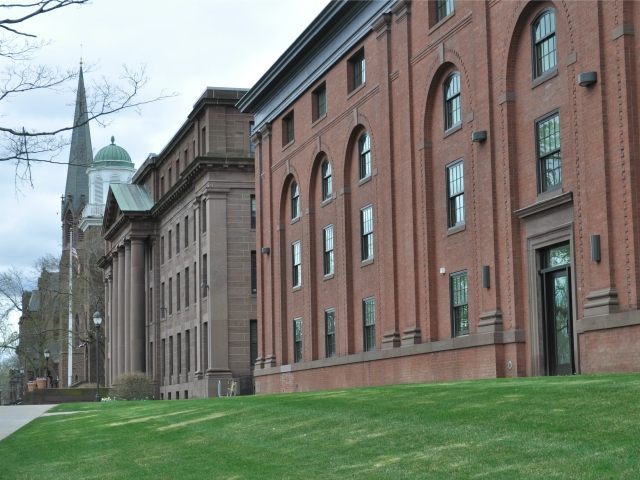A group of students at Wesleyan University are demanding “safe space” for students of color and declaring they intend to “dispose of” copies of the school newspaper found on campus until their demands are met. The demands arose after the paper ran an opinion piece critical of the Black Lives Matter movement last week.
Wesleyan student Bryan Stascavage wrote a piece titled “Why Black Lives Matter Isn’t What You Think,” which was published in the student newspaper, the Argus, last Monday. His piece offers comments from a police officer and also from a supporter of the BLM movement. Stascavage says he supports the movement’s goals but concludes, “It boils down to this for me: If vilification and denigration of the police force continues to be a significant portion of Black Lives Matter’s message, then I will not support the movement.”
Stascavage read the comments to his article, expecting it would create some discussion but was surprised the feedback instantly turned personal. He described what he was seeing to the Student Press Law Center, saying, “It wasn’t constructive. It was (that) I’m racist, I should never publish again.”
But the response to Stascavage wasn’t limited to the comments section of the newspaper. He estimates students took up to half of the 1,000-issue print run of the newspaper containing his opinion piece and destroyed it. One female student confronted Stascavage in a cafe. The argument became so heated that one of his friends was preparing to dial 911.
Without consulting Stascavage, the newspaper’s staff bowed to student pressure and published an obsequious front-page editorial, apologizing for the hurt feelings and suggesting that they had not properly fact-checked the opinion piece. The editorial stopped short of withdrawing the piece or saying it had been a mistake to publish it, but the tone was definitely one of retreat.
To his credit, University president Michael Roth took a tough stance in defense of free speech, even criticizing those who claimed to feel unsafe because of someone else’s published opinion:
Some students not only have expressed their disagreement with the op-ed but have demanded apologies, a retraction and have even harassed the author and the newspaper’s editors. Some are claiming that the op-ed was less speech than action: it caused harm and made people of color feel unsafe.
Debates can raise intense emotions, but that doesn’t mean that we should demand ideological conformity because people are made uncomfortable. As members of a university community, we always have the right to respond with our own opinions, but there is no right not to be offended. We certainly have no right to harass people because we don’t like their views. Censorship diminishes true diversity of thinking; vigorous debate enlivens and instructs.
So far, 167 students and some staff have signed a petition which threatens to boycott the newspaper (including destruction of its print run) until their demands are met. The group also wants all student funds cut off until the university creates a work/study position that would allow students to get credit for writing for the paper. Also, the group wants “once-per-semester Social Justice/Diversity training” and an open space on every front page dedicated to “marginalized groups/voices.” In the event the newspaper received no submission in a given week, it is to leave this space blank.
Michael Ortiz, a 17-year-old who signed the petition, told the Argus, “That the Argus chose to give this man somewhere to share his disrespectful opinion and to then have the Argus and its staff members defend the publication, hiding behind the argument of ‘well it’s not my opinion but he’s allowed to have it’ is frankly a great disappointment.” Ortiz added that the publication of the piece was “a silent agreement with its content, and a silent agreement to the all too prevalent belief that black [and] brown people do not deserve a voice, and that we are not worthy of respect.”
Paul Singley, President of the Connecticut Society for Professional Journalists, offered an opposing opinion in defense of free speech. He told the Argus, “I think it’s a dangerous thing when you have the people that are controlling your purse strings determining what kind of opinions you’re going to allow to be shared in your publication.” He added, “You shouldn’t be second guessing whether you should publish something that you certainly have the right to just because you’re going to lose funding. That’s an unhealthy situation.”

COMMENTS
Please let us know if you're having issues with commenting.